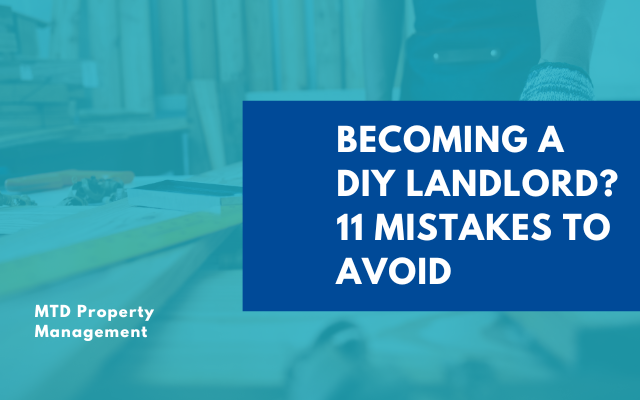If you’ve gone through the eviction process and the difficult tenant has finally moved out, some of their belongings might have not. This can be another source of frustration, however, it’s important to know that your responsibilities as an Illinois landlord don’t end after they were evicted.
Clearing out their personal belongings is not as simple as throwing them away. If a tenant abandonds property, the property owner still has to give the tenant reasonable time to retrieve them before moving forward with the property removal. If these responsibilities are not fulfilled, the landlord might face very expensive consequences.
Not all landlords are familiar with what needs to be done with the tenant’s personal belongings that were left behind. That’s why the experts at MTD Property Management have put together this article to guide landlords in the process.
Give Tenants a Chance to Retrieve Their Items
Although not every state has laws that specify that landlords need to keep an evicted tenant’s belongings, it is reasonable for landlords to give the tenant a chance to recover what they left behind. By giving the tenant time to pick their things up, the landlord is also reducing their risk of being sued for lost personal property.

Illinois state law dictates what must be done so make sure that you are well-versed with the rules, ordinances, and regulations in your city. In Chicago, for example, landlords must store or hold any valuable personal property for seven days before throwing it away.
Holding on to the tenant's personal property for a few days is fairly easy and the costs associated with it will be shouldered by the tenant. Landlords can deduct the cost of cleaning up the personal property they abandoned from their security deposit. Some cities may require a longer time frame for keeping the belongings, so make sure that you know your city’s local laws.
Storage and Disposal
If you’re unsure about what to do with the things the tenants left behind, you can follow the guidelines listed below:
1. Take Out the Trash
When you’re sure that certain items left by tenants are trash, you can dispose of them. This is usually things like perishable food, empty bottles, and newspapers. If you paid for the disposal, make sure to keep the proper documentation for it.
2. Organize and Create an Inventory
Once all garbage has been thrown away, the landlord can now identify the products with value and prepare a detailed account of these things. If possible, include photos of all the items on your list. Locked or sealed items must not be opened but must be included in your documentation and must be stored accordingly.

3. Store the Items
Before storing valuable items, landlords must know the local and state laws. In general, you can store the items on the rental property or somewhere safe such as a storage unit. Most landlords want to fill the vacancies as soon as possible so their best bet is to pay for a storage unit for the abandoned items. Always be knowledgeable of the local laws before
moving these abandoned items to your preferred storage unit.
4. Send the Tenant Notice
Since the goal of documenting and storing the items is to give the tenant a chance to retrieve them, the former tenants must know where they can claim them and how long you’re going to keep their things.
The tenant must be informed through written notice and include how much you’re charging them for doing this.
The following information should be included in the tenant legal notice you’ll be mailing them:
- An itemized list of the abandoned tenant property.
- Associated price or estimated value of each item.
- Where they can retrieve their belongings.
- The time frame they have to pick up their things.
- The next steps when left unclaimed.
Just to cover all your bases, send the notice to the tenant’s listed emergency contact as well.

5. Dispose of or Sell the Items
If the retrieval period has passed and the evicted tenant failed to pick up their abandoned items, property owners can proceed with their next step which is either to dispose of or sell the things. If for some unknown reason the tenant left their car, it should be reported to the local law enforcement as abandoned property.
If you want to get rid of the car or other belongings that can be sold, it’s important that you check your local regulations. You can’t just take ownership of the former tenant's property or sell it without
reporting it to the authorities. In some states, you are required to give the profits you make in selling abandoned properties to the state.
6. Pay Yourself
If storing the abandoned items caused damage to your rental property and you incurred financial losses while holding on to them, make sure that these are all accounted for as well. Any profits that landlords make in selling their personal properties can be used to pay for the costs.
Protect Your Future
If you get stuck in an unwanted situation of getting rid of the tenant's abandoned belongings for an excessive amount of time due to local ordinances, take this as a hard-learned lesson. To avoid this from happening again, make sure that you update your lease agreement by adding a specific clause detailing the steps in dealing with abandoned property.

When adding your terms and conditions, remember to highlight the following details:
- Offer options and arrangements if it’s not possible for the tenant to move all of their belongings at once.
- Give written notice to the former tenant and their emergency contact on where and how they can retrieve their belongings.
- Provide a detailed list of the tenant's abandoned property.
- Store valuable personal property.
- State if you’re expecting to be reimbursed by the tenant for the costs associated with moving and storing their belongings.
- Detail how much time you’re giving the tenant in safekeeping their valuable items.
- Include any disposal fee for the abandoned property.
- Declare that their personal belongings will be classified as legally abandoned should the tenant fail to claim them.
Conclusion
As an Illinois landlord, dealing with abandoned properties can be a headache and can result in loss of profits in your rental business. Remember to always align your best practices with Illinois state laws.
If you’re unsure about how to properly handle abandoned properties and reduce these types of situations, you can reach out to MTD Property Management for assistance. We provide professional property management in Chicago with a personal touch.
Contact us today!









